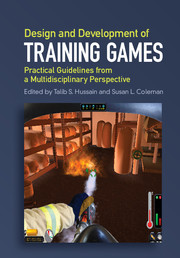Book contents
- Frontmatter
- Dedication
- Contents
- Contributors
- Acknowledgments
- Introduction
- Chapter 1 Learning Game Disciplines
- Chapter 2 Communication for Stronger Learning Game Design
- Chapter 3 Instructional and Gaming Elements
- Chapter 4 Story for Learning and Gaming
- Chapter 5 Authenticity in Learning Games
- Chapter 6 Design Better Games
- Chapter 7 Bridging the Gap from Design to Implementation
- Chapter 8 Integrating Games into Learning Environments
- Chapter 9 Multidisciplinary Learning Game Development Method
- Chapter 10 Game Review Criteria
- Chapter 11 Game Review
- Chapter 12 Development Methods
- Chapter 13 Game Review
- Chapter 14 Development Methods
- Chapter 15 Game Review
- Chapter 16 Development Methods
- Chapter 17 Game Review
- Chapter 18 Development Methods
- Chapter 19 Game Review
- Chapter 20 Development Methods
- Chapter 21 Game Review
- Chapter 22 Development Methods
- Chapter 23 Game Review
- Chapter 24 Development Methods
- Index
- References
Chapter 13 - Game Review
Quest Atlantis
Published online by Cambridge University Press: 05 May 2015
- Frontmatter
- Dedication
- Contents
- Contributors
- Acknowledgments
- Introduction
- Chapter 1 Learning Game Disciplines
- Chapter 2 Communication for Stronger Learning Game Design
- Chapter 3 Instructional and Gaming Elements
- Chapter 4 Story for Learning and Gaming
- Chapter 5 Authenticity in Learning Games
- Chapter 6 Design Better Games
- Chapter 7 Bridging the Gap from Design to Implementation
- Chapter 8 Integrating Games into Learning Environments
- Chapter 9 Multidisciplinary Learning Game Development Method
- Chapter 10 Game Review Criteria
- Chapter 11 Game Review
- Chapter 12 Development Methods
- Chapter 13 Game Review
- Chapter 14 Development Methods
- Chapter 15 Game Review
- Chapter 16 Development Methods
- Chapter 17 Game Review
- Chapter 18 Development Methods
- Chapter 19 Game Review
- Chapter 20 Development Methods
- Chapter 21 Game Review
- Chapter 22 Development Methods
- Chapter 23 Game Review
- Chapter 24 Development Methods
- Index
- References
Summary
Abstract
Quest Atlantis is a virtual world that has been developed for the express purpose of leveraging children’s familiarity with online videogame metaphors to provide flexible and high-quality educational curricula to students. The combination of compelling technology, a rich ecosystem of educational materials, and a class-centric focus contributes to a complete system that stands on its own as well as offers guidance to developers of similar systems.
Introduction
Quest Atlantis (QA) is a three-dimensional virtual world designed from the ground up to be an engaging educational environment for middle and early high school children (Barab et al., 2005) using the principle of transformational play: “In transformational play, students become immersed in activities that engage them intellectually and push back on their thinking and actions. Rather than working on problems in which they must imagine the implications of their decisions (as in most project-based work) students experience consequentiality” (Barab, Gresali, & Arici, 2009 , p. 77).
- Type
- Chapter
- Information
- Design and Development of Training GamesPractical Guidelines from a Multidisciplinary Perspective, pp. 377 - 392Publisher: Cambridge University PressPrint publication year: 2014

